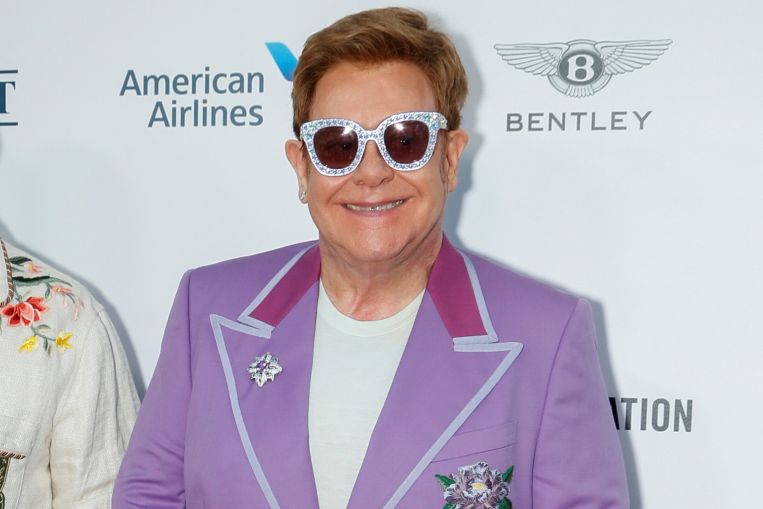When Elton John was successful enough to buy a plane, he picked a notorious one: a purple and gold flying tour bus reputedly favoured by Led Zeppelin for wild parties.
As a man who once played before 500,000 people dressed in a Donald Duck costume, he had it repainted to suit his own idea of good taste, then proceeded to break Led Zeppelin’s depravity record.
In Me, a hair plugs-and-all memoir that pushes the envelope for ageing rock star candour, he describes the shrieks of his mum (“Oh! I can’t look!”) as she insisted on watching the 1972 porn film, Deep Throat, aboard the plane while John’s band members presumably cringed and kept their distance. What son invites this kind of behaviour from his constantly abusive mother?
If John had no material other than the job his foul-tempered parents did on him, he’d still have a riveting story to tell. But Me is a very crowded book by a man who’s kept a lot to himself until now.
This year, the movie Rocketman gave a reasonably accurate overview of the Elton John story – but it barely scratched the surface of what’s in this memoir. The lurid parts will get all the headlines. But the man’s hard-won self-knowledge is what the book’s really about.
In the rock star cosmos, John occupies an unusual place. He grew up in the kind of dismal suburb that most 1960s rebels couldn’t wait to escape. But he liked that life, and lived with his extended family into young adulthood. He belonged to the Reader’s Digest Book Club.
When an act of fate threw him together with Bernie Taupin, his writing partner and lyricist, they both lived in John’s family roost thanks to bunk beds. Not even the wildest excesses of his later life would change his fundamentally bourgeois nature.
Perhaps not surprisingly, he has been sniped at by some of the music world’s most scathing types, among them Keith Richards and David Bowie. Unlike any of them, he’s known for doing handstands while playing the piano.
Once he and Taupin had their first big hits, an American tour was obligatory.
He tells wonderful stories about being at the Troubadour in Los Angeles, where he stunned audiences who had never seen anything like him; of going to Laurel Canyon and meeting all those people whose albums he owned; of accepting Brian Wilson’s invitation to pay a house call and being unnerved by Wilson’s singing the chorus from Your Song (“I hope you don’t mind”) over and over. He was something new, pure pop and great fun. Everyone wanted to know him – including groupies, whom he became very good at dodging.
It took gay friends to assure him that he was gay whether or not he knew it. He was unable to do much about that until he was 23, but he made up for lost time. He writes frankly about his jealous nature, his tendency to have his heart broken by straight men and his inability to move slowly with anyone. He was possessive and then dismissive, a trait he shared with his friend Rod Stewart.
Aids, which killed close friend Freddie Mercury, has been an important cause to John for a long time. He founded the Elton John Aids Foundation in the early 1990s, and the memoir more than once refers to his advocacy to explain away some controversy or other.
John describes himself as a sexual voyeur, and speculates that his desire to look rather than touch may have kept him safe from the disease.
Aficionados of rock star memoirs, take note: This one also gets into John’s bout of prostate cancer, complete with his surgery and use of adult diapers. The latter may be a first in the genre.
He is even more frank about addiction. Most of his best-known work was behind him when drugs became part of his life. He also had bulimia and would become furious when anyone suggested he get help for any of these problems.
As an example of how low he could go, he describes being shown a hotel room with the furniture in splinters, asking who did the damage and being told that the rampage had been his.
What finally sobers him up is the combined effect of losing so many friends and watching what happens when somebody he cares about goes to rehab. He is scornful about the process until, suddenly, he isn’t. And it works.
Among other tidbits from the sober life, John reveals that he is Eminem’s Alcoholics Anonymous sponsor and reveals the obscenity Eminem uses by way of greeting.
Me was written with the help of British music critic Alexis Petridis, who met with John frequently, heard his stories and created a facsimile of how John speaks.
There’s the hand of a pro in the book’s polished transitions and foreshadowing. But judging from the glimpses of John’s own writing that the book provides, the voice here sounds just right, even if it has been unfamiliar until now.
It’s a gift to finally hear from someone who has delivered so many of Taupin’s words and so few of his own.
NYTIMES
Source: Read Full Article
